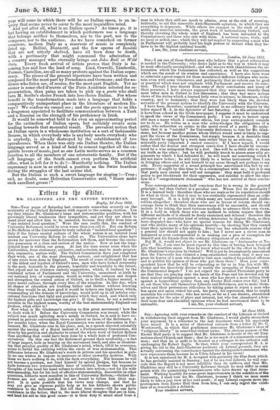ad June 1852.
Sin—Agreeing with your remarks on the conduct of the Liberals at Oxford in withdrawing their support from Mr. Gladstone, I would gladly strengthen your argument by a reference to the last document which his opponents have issued. It is a series of rhetorical extracts from a letter by Mr. C. Wordsworth, in which that gentleman denounces Mr. Gladstone's ideas of "religious liberty" in somewhat violent terms. The obviou, purpose of the Exeter Hall party is to suggest that Mr. Gladstone is hostile to the old Tory notions about Church and state; that he is too much of a nineteenth-century man ; and that he is unfit to be trusted as a colleague to the orthodox and unchanging Sir Robert Inglis. So that, while your correspondent M. A. is giving his aid to the Anti-Gladstone partisans on Liberal grounds, they are actually canvassing the constituency against the distinguished statesman who now represents them because he is Ultra-Liberal in his views! It is not unnatural for M. A. to regard with partiality the Blue Book which he has probably assisted in framing ; but if he is a real Liberal, he will con- cede that the Report is not more infallible than its authors, and that Mr. Gladstone may still be a University Reformer though he may differ in some points with the painstaking Commissioners who have drawn up that docu- ment. Wishing heartily for some great improvements in the condition of the University, I shall vote for Mr. Gladstone, because I think no man more likely to take a just view of her real needs : if any Liberal expects more im- provements from Exeter Hall than from him, I can only regret the erns' t- ence of so remarkable a delusion.


























 Previous page
Previous page